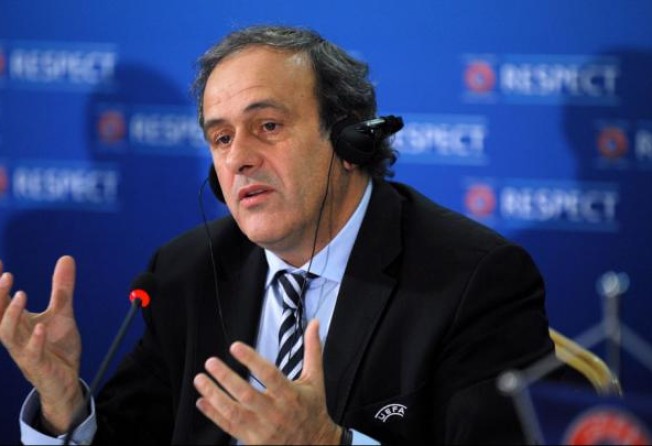Credibility of match officials put at risk
Uefa president Michel Platini is wrong to shun technology in his blind pursuit of promoting additional assistant referees

The politicking of Uefa president Michel Platini, with his persecution of technology and promotion of additional assistant referees, has the side effect of biasing match officials.
Take the case of Pierluigi Collina. His achievements on the pitch are second to none, and he has rightly earned the respect of almost everyone for his refereeing accomplishments. Chief among his officiating characteristics were his credibility, control and clout.
Collina is now chief refereeing officer at Uefa, but because he is paid by the European soccer organisation, he has to toe Platini's party line.
Recently Platini reiterated this line, which is to dismiss goal-line technology (GLT) in favour of his own idea of the clumsily termed and awkwardly positioned AARs (additional assistant referees). These officials stand along the goal line trying to look useful.
Platini claims Frank Lampard's goal-that-never-was during the 2010 World Cup is not worth €54 million (HK$537 million), which he says is the price of installing goal-line technology to cover Champions League matches. He maintains that a "once-in-a-blue-moon" goal happens only once in 40 years and therefore is not worth solving with expensive GLT.
Putting financial concerns in context, at the end of this season's Champions League, Uefa will bank €335 million from an estimated gross commercial revenue of €1.34 billion.
Platini is sticking with using AARs because it is his brainchild.
"In the Champions League, I'm very happy with the results [of a five-man team]. Practically no mistakes have been made and the referees see practically everything that happens on the pitch," Platini said.
Practically, Platini is wrong. And in supporting his boss, Collina is risking his credibility by backing AARs. Their claims, which can be seen in a video on Uefa's website titled "Additional assistant referees DVD for FAs [football associations]", smack of bias, cherry-picking and doctoring of data.
In the video, Collina makes four false claims to support the use of AARs. First, he says there is a better assessment of fouls occurring around the penalty area when referees are not able to make a decision. But Collina presents no hard evidence. The first example used in Uefa's video to support this claim is a complete embarrassment. It shows English referee Mark Clattenburg as the AAR communicating with another English referee Howard Webb through their radio headsets during a Euro 2012 match. Clattenburg spotted a foul in the penalty area, but Webb also saw the foul, which means this is an inappropriate example to support the use of AARs. It negates Collina's first claim.
Second, he says there has been a reduction in holding, pulling and blocking at set pieces due to the deterrent effect of AARs. Again, Collina provides no data. Many fans will know that in a Champions League match between Celtic and Juventus in February, there was an extraordinary amount of blatant holding, pulling and blocking by the Italians. The presence of extra match officials obviously did not act as a deterrent and therefore Collina's claim cannot be taken seriously.
Third, Collina says there is better control of the goal line to determine whether the ball crosses it. In Euro 2012, Ukraine's goal-that-never-was against England, when John Terry acrobatically cleared the ball in the split second it had crossed the goal line, demonstrates that having AARs is ineffective. GLT would have given the correct call. Also, the fact that these "blue-moon" goals occur more frequently than once every 40 years shows Platini to be in complete denial.
Fourth, Collina says during Euro 2012 there was improved accuracy in offside decisions because linesmen could focus their attention on offside situations, leaving foul detection to the AARs. "We had more than 96 per cent accuracy for about 430 offside decisions with 27 goals scored in difficult offside-onside positions," Collina said.
The closest comparable data comes from the 2010 World Cup technical report: "Of the 145 goals awarded, 142 were correctly given. Furthermore, 13 goals were correctly disallowed for offside [100 per cent accuracy] and two more goals should have been allowed, meaning 96.88 per cent of the decisions were correct overall."
Collina's 96 per cent accuracy claim does not indicate any improvement with AARs.
Platini's influence on Collina, and their subsequent false claims for AARs is damning. Collina has even got referees, such as Webb, to sing the praises of AARs despite evidence against their effectiveness.
How sad that the politics of soccer can adversely affect the objectivity, and hence credibility, of match officials.